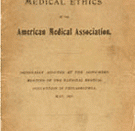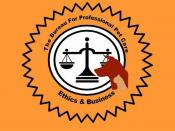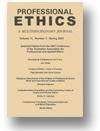The way in which police treat citizens have a ripple effect on community opinions, as these citizens impart their experiences to friends, family, and neighbors. One's moral principles on right and wrong behavior are a form of discipline. Morals and ethics are often used interchangeably, and everyone has his own value system (Thomson and Wadsworth, 2005). Moreover, the code of ethics is an officer's behavior of his credibility and validity. The officer must uphold the law regardless of the offender's identity.
According to Sykes (1989), a law enforcement informal code of ethics generally covers several aspects. The most important one being the principle of fairness and justice: An officer must uphold the law regardless of an offender's race, social status or identity. One must not abuse his powers to take advantage or give special treatment to citizens, which turn out to be the main source of solicitation and acceptance of gratuities (pp.
141-142). In addition, a precinct with a value system empathizing crime control may allocate resources differently from one with a value system promoting community-oriented policing (p. 139). In fact, officers within these two precincts would be rewarded differently, and the formal culture of the agency would encourage different behavior patterns (Thomson and Wadsworth, 2005, p. 140).
According to Scheingold (1984), law enforcement typically forms a homogenous social group in a closed social system. This leads to the extreme nature of police (formal ethics) subculture (p. 144).
The three distinctive codes: First, the perfect professional, second, guidelines or his principles, and third, mandatory rules that serves as discipline. For example, an oath of duties and the sacred trust of an officer. An individual officer's code of ethics is more specific to his behavior, whereas a professional code allows discretionary practices and unique issues of that particular profession (Thomson and...


